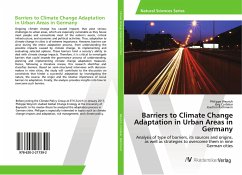Ongoing climate change has caused impacts that pose serious challenges to urban areas, which are especially vulnerable as they house most people and concentrate most of the nation's assets, critical infrastructure, and economic and political activities. Thus, adaptation to climate change in cities is of extreme importance. However, barriers can arise during the entire adaptation process, from understanding the possible impacts caused by climate change, to implementing and evaluating selected options. These barriers limit a society's ability to deal with climate change impacts. Therefore, it is critical to investigate barriers that could impede the governance process of understanding, planning and implementing climate change adaptation measures. Hence, following a literature review, this research identifies and classifies barriers. Based on semi-structured interviews with decision-makers in nine cities, the study will contribute to the discussion on constraints that hinder a successful adaptation by investigating the nature, the source, the origin and the relative importance of social barriers to adaptation. Finally, the analysis provides insights into how to overcome such barriers.
Hinweis: Dieser Artikel kann nur an eine deutsche Lieferadresse ausgeliefert werden.
Hinweis: Dieser Artikel kann nur an eine deutsche Lieferadresse ausgeliefert werden.








